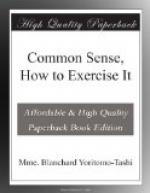From the reasoning which would have ensued, the following truth would most certainly have been revealed.
“If I were in the other man’s place, I should certainly think as he does.”
This premise once laid down, the conclusion would be reached; all the more exact, because, without abandoning their arguments, each one would present those which it is easy to turn against an adversary.
Before solving a problem, he who desires to avoid making a mistake must never fail to ask himself this question:
What should I do if my interests were those of the opposite party?
Or, yet again:
What should I reply if my adversaries used the same language to me as I purpose using when addressing them?
This method is valuable in that it raises unexpected objections, which the mind would not consider if one had simply studied the question from one’s own point of view.
It is a self-evident fact that, according to the state of mind in which we are, things assume different proportions in the rendering of judgment on them.
We must not argue as children do, who, not having the sense of calculating distances, ask how the man standing near to them will be able to enter his house, which they see far away, and which seems to them of microscopic dimensions.
One departs from common sense when one attributes to insignificant things a fundamental value.
We neglect to consider it in a most serious way when we adopt principles contrary to the general consensus of opinion accredited in the environment in which we are living.
“A high dignitary of the court,” says Yoritomo, “would be lacking in common sense if he wished to conduct himself as a peasant and, on the other hand, a peasant would give a proof of great folly were he to attempt the remodeling of his life on the principles adopted by courtiers.
“He who, passing his life in camps, wished to think and to act like the philosopher, whose books are his principal society, would cause people to doubt his wisdom; and the thinker who should adopt publicly the methods of a swashbuckler would only inspire contempt.”
In ordinary life, one ought to consider this faculty of common sense as the ruling principle of conduct.
One can be lacking in thought, in audacity, in brilliant qualities, if only one possesses common sense.
It takes the place of intelligence in many people, whose minds, unaccustomed to subtle argument, only lend themselves to very simple reasoning.
A versatile mentality rarely belongs to such minds, because it is not their forte to unfold hidden truths.
It walks in the light and keeps in the very middle of the road, far from the ambushes which may be concealed by the hedges of the cross-roads.
Many people gifted with common sense but deprived of ordinary intelligence have amassed a fortune, but never, no matter how clever he may be, has a man known success, if he has not strictly observed the laws of common sense.




